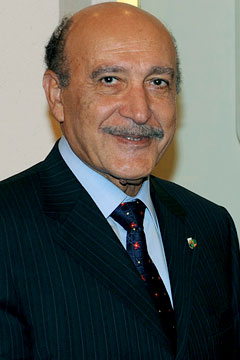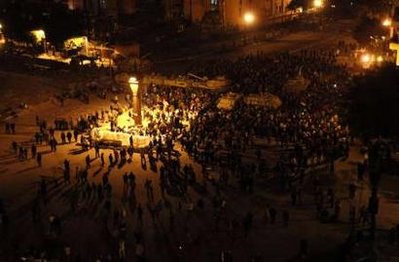|
|
Egyptian Government Offers Big Concessions February 7, 2011
The Egyptian government, at the instigation of Vice President Omar Suleiman, has offered major concessions to opposition groups, in an attempt to placate the large crowds of people who continue to gather in Cairo's Tahrir Square and elsewhere around the city and country. Among the offers was a restoration of a free press and a promise to remove the emergency laws that have been in place since President Hosni Mubarak took office in 1981.
Also on offer from Suleiman was a pledge not to harass anti-government protestors. (A curfew still exists in Tahrir Square, but it is not being enforced with a heavy hand by the soldiers manning the tanks that ring the square.) But it was the hint of the eventual lifting of the emergency laws that got the most attention, inside Egypt and out. Among the far-reaching powers granted the government under the laws, which were instituted after the assassination of then-President Anwar Sadat, are an ability to strongly curtail what and how news outlets report and a precedent for detaining prisoners without certain fundamental rights. The government has pledged to set up an office to deal with complaints about political prisoners and to ensure that complaints of government corruption are deal with quickly and efficiently.
Schools, many stores, and some banks reopened for the first time since the crisis began, in late January. Banks closed after three hours, though, despite long lines of people anxious to secure cash. Traffic levels were near normal in Cairo. Another concern voiced outside the country was a possible increase in global oil prices in response to the crisis. Officials in nearby Kuwait worried that oil prices, which have hit $100 a barrel for the first time since 2008, could go even higher if stability does not return soon. Egypt does not export oil or gas on levels with Saudi Arabia and other Middle East powerhouses, but Egypt does have control of the Suez Canal, through which many oil tankers flow, and the Suez-Mediterranean oil pipeline, which runs near the Egyptian capital. |
Social Studies
|

 Suleiman met with representatives of several groups, including the Muslim Brotherhood, the country's largest opposition group that is nonetheless outlawed. Also represented was Mohamed ElBaradei, a winner of the Nobel Peace Prize and an outspoken leader of Egypt's democratic movement.
Suleiman met with representatives of several groups, including the Muslim Brotherhood, the country's largest opposition group that is nonetheless outlawed. Also represented was Mohamed ElBaradei, a winner of the Nobel Peace Prize and an outspoken leader of Egypt's democratic movement. What has not changed is the name of the man atop the governmental structure: Hosni Mubarak is still the president. He has said that he would not run for re-election. Elections are scheduled for September, but opposition groups (and many world leaders) want Mubarak to step down before that time. For his part, Mubarak has said that any abdication by him needs to result in an orderly transition of government.
What has not changed is the name of the man atop the governmental structure: Hosni Mubarak is still the president. He has said that he would not run for re-election. Elections are scheduled for September, but opposition groups (and many world leaders) want Mubarak to step down before that time. For his part, Mubarak has said that any abdication by him needs to result in an orderly transition of government.
